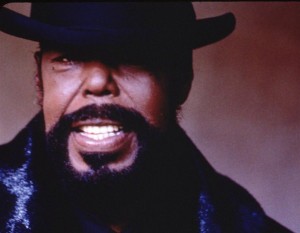LOVE: IT’S A tricky thing, to say the least.
Mulling over this timeless subject recently, I pulled two books off my shelf that treat the matter in differing ways: Alain de Botton’s Essays in Love and Barry White’s Love Unlimited: Insights on Life & Love. Neither of these books is new, but there’s no reason not to dip into their wisdom from time to time as a sort of compare-and-contrast textual analysis.
White’s text mostly charts the course of his career as a sex-drenched R&B singer while also offering his perceptions on romantic love. Each chapter begins with lyrics from one of his songs, which help to flesh out his Weltanschauung when it comes to life & love. De Botton’s text is actually not a collection of essays, as the title suggests, but a novel that follows the relationship between a man and a woman who meet on an airplane and subsequently fall in love. De Botton, well known for his friendly philosophical books on topics such as travel, happiness, and Proust, takes an analytical stance when examining the peaks and troughs of relationships.
De Botton’s male protagonist tends to be a worrier as he begins his romance with mercurial, winsome Chloe. He believes their meeting to be a case of love at first sight, or “romantic fatalism.” But his active mind can’t stop examining every moment of the unfolding relationship: “What is so frightening is the extent to which we may idealize others when we have such trouble tolerating ourselves….We fall in love hoping we won’t find in another what we know is in ourselves, all the cowardice, weakness, laziness, dishonesty, compromise, and stupidity. We locate inside another a perfection that eludes us within ourselves….”
It’s the rose-colored-glasses stage of love. White’s text acknowledges this same tendency but takes things in a less neurotic, almost Buddhist direction: “We have to know who we are before we can love ourselves, and then know who it is we want to give that love to. Love is priceless yet everywhere. The ticket to admission into that special place where love lives can be gotten only by feeling you are already there in your heart.” And here White addresses his female readers in particular, as he does at various points throughout the text: “Use your power to love wisely, ladies, please, use it wisely, and you will be happy.” The subtextual message White is working with here seems to be something like: Men can be assholes, ladies, so pick through the merchandise carefully before making your purchase.
De Botton also frequently addresses the issue of rash decisions, but acknowledges that our natural cravings by default often lead us into precarious territory. But if we are willing to take the risk, he seems to say, then we can eventually enter the next stage of love, which consists of really knowing the other person. This involves allowing the other to be less than ideal—“The most interesting faces generally oscillate between charm and crookedness. The more tempting kind of beauty…flirts dangerously with ugliness.” And here he cites Proust in his assertion that “classically beautiful women should be left to men without imagination.” (Women the world over have loved Proust for that remark.)
The other ingredient in this warts-and-all stage of love is the willingness to be ourselves. De Botton dramatizes it this way: “Chloe could read in bed and slide a finger into her nostril to clear an obstruction, roll it into a ball until it was dry and hard, and swallow it whole—without needing to hide or apologize.” De Botton uses these kinds of moments as an illustration of the end of the honeymoon period and the beginning of the real relationship.
White does not explicitly address this stage of love but does accentuate the need to continually give of oneself in order to sustain the relationship. Chapter two of his text begins with lyrics to his hit song “Never, Never Gonna Give Ya Up,” in which the speaker urges, “Keep on, keep on doin’ it/Right on, right on doin’ it/I’ll have to keep you pleased/In ev’ry way I can/Gonna give you all of me/As much as you can stand.”
And then there is the matter of how to make things last, longevity, “sticking it out” after the embers have cooled. White concedes that “falling in love may not last forever,” but he stresses the need for loyalty: “If you try to sneak out the back door of love, you will be shown the front door.”
De Botton does not directly work with the trope of the “back door” but does acknowledge that once love begins to fade for one of the partners, the jilted one may resort to “romantic terrorism,” consisting of “sulking, jealousy, guilt.”
White takes time to note that his first love in life was his mother and that the second was always “Lady Music.” Throughout the text he anthropomorphizes music: “I love her in a special way. We’ve been fruitful and had lots of babies together.”
It would follow, then, that White’s longtime wife Glodean must have come in third. He doesn’t dwell on the matter of his fidelity to Glodean, but one extratextual side note worth mentioning: In 1999, when his book was first published, I interviewed him for a magazine article and asked him how he felt about monogamy. It seemed an obvious question, given his international reputation as a ladies’ man. He hesitated, stammered a bit, and then replied, “Uh, yeah, I’m monogative.”
Monogative. White gave the impression of not exactly being familiar with the concept, but one can only speculate so much about these things.
In De Botton’s text, the male lover ultimately struggles to juggle “the idiocy of infatuation with its inevitability. Love had to be appreciated without…constructing a philosophy of one’s fears.” His narrative concentrates on the selfish, clinging, frustrated, insecure nature of love more than the liberating, expansive side of love that White explores. It’s interesting to speculate what White might have given as counsel to De Botton’s nervous protagonist. He may have admonished him to simply tell his exasperating girlfriend to “Put on my favorite dress/You know, the one that oozes sexiness.”






I will be grateful if you continue this in future. A lot of people will be benefited from your writing.